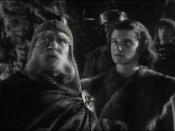In ShakespeareÃÂs ÃÂMacbethÃÂ the protagonist undergoes many changes throughout the play. Looking over it we cannot specifically say to what extent of a tragic character Macbeth is, but by segregating it into distinct parts we get a clearer idea of how Macbeth ventures from one polarity to the other. Macbeth is manipulated by others (particularly his wife and the witches), this allows his iniquitously self-centred character hidden within to come alight. Through ShakespeareÃÂs use of soliloquies we can see that his conscience is conflicted and that his actions are centred on the voices of the external forces. As the play progresses the desires of the main character become self-perpetual eventually leading to his demise. Macbeth is a tragic character. His gradual increasing extent caused by growing negative ambition and greed evidently portrays how such qualities can have an effect on oneÃÂs life.
At the beginning of the play Macbeth was displayed as a character with high morality that had an urge to do the utmost best for his king.
Those who spoke about ÃÂnoble MacbethÃÂ only remarked on courageous and patriotic virtues. This reputed image wasnÃÂt whole-heartedly held for long, as the meeting with the weird sisters opened his thoughts to a different perspective, the perspective of cupidity. The further entitlement of ÃÂCawdorÃÂ forced Macbeth to focus on the prophecies made earlier, allowing his mind to dwell on the fact of becoming king. It was quite noticeable that this was the stage of the play where Macbeth had transformed from a heroic being to a ÃÂtragic character.ÃÂShakespeare displayed that one can be a calamitous not only by committing treacherous crimes but also by showing how responsive they are to unpropitious influences. The lead character although covetousness to become King couldnÃÂt build up the courage to go against what was right deciding to ÃÂproceed no further in the businessÃÂ. Lady Macbeth sensing the fear in Macbeth acted as a catalyst in drawing the hidden values of greed and carelessness dormant within her disturbed husband. She viciously abused his manliness and compared him to a ÃÂpoor cat IÃÂthÃÂadageÃÂ cleverly manipulating his uncertain mindset. The Thane of Cawdor blindly accepting the toxic words of his wife a ÃÂviciously murdered the virtuous King Duncan, to seize the throne for himself. Not only did the accepting of the external forces evolve his destructive character but allowed him to actually perform a tragicÃÂ deed.
It is often that once an immoral deed is done, another follows it to preserve it hidden, and henceforth another creating an endless chain of unrighteous deeds. It is this trail of thought that blinds one from what is truly right. After the murder of King Duncan, Lady MacbethÃÂs powerful personality began to disintegrate, leaving Macbeth to remorse alone. He fluctuated between fits of fevered action, in which he plotted a series of murders to secure his throne. This was prominent when he announced ÃÂthe firstlings of my heart shall be the firstlings of my handÃÂ out of pure aggravation. As he embarked on further atrocities with ease the audience could see that he truly had become a ÃÂtyrantÃÂ. Shakespeare carries on portraying Macbeth at the extreme of his vicious behaviour when he replied ÃÂshe should have died hereafterÃÂ to the announcement of his wifeÃÂs death; showing signs of his ÃÂremorseful character.ÃÂThe playwright has ingeniously entwined two distinct characteristics in the character of Macbeth. We as the audience can observe the various stages of the play where the protagonist exhibits different extents of tragic behaviour. It is through this variety of qualities that we see in one character which allows us to identify ShakespeareÃÂs overall message. We are all human beings; therefore there will be temptation within us all to lead a life and be a person we are not, but it is our mental strength, our discretion of what is right and wrong and our power to say ÃÂnoÃÂ, is all that will keep us from ever setting foot on a villainous road.
Bibliography: shakespeare text book, shakespeare note book






Quite good
i think overall this was a good essay. how ever i do not agree with "Looking over it we cannot specifically say to what extent of a tragic character Macbeth is" as it may seem as though you are not answering the question or sitting on the fence
but good otherwise!
0 out of 0 people found this comment useful.